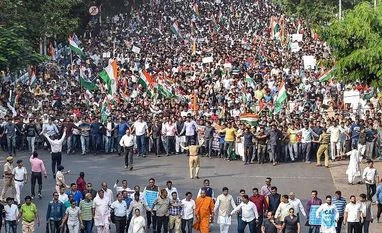Amid CAA protest, West Bengal stays work on National Population Register
Chief Minister Mamata Banerjee made it clear that the citizenship law and the proposed NRC will not be implemented in the state
)
Mamata Banerjee leads a rally of thousands of partymen, vowing not to allow NRC and Citizenship Act in West Bengal in Kolkata. Photo: PTI
The West Bengal government on Monday stayed all activities relating to the preparation and update of the National Population Register (NPR) in the state, amid furore over a contentious amendment made to the citizenship law.
An order issued by the Home and Hill Affair Department Census Cell to commissioners of Kolkata and Howrah municipal corporations and all district magistrates said that all activities regarding the preparation and update of NPR are stayed.
"No activity regarding NPR may be taken up without prior clearance from the government of West Bengal. The order is issued in the interest of public order," it said.
The decision comes amid violent protests in parts of Bengal over the amended Citizenship Act and Chief Minister Mamata Banerjee making it clear the law and the proposed NRC will not be implemented in the state.
It drew sharp reactions from the BJP.
Also Read
"The NPR was done for the purpose of census, under the National Census Act. What the state government is doing is unconstitutional. It is because the TMC government is now nervous as census might bring out the truth about changing demography in the state and is only worried about her minority votebank," BJP state vice-president Jay Prakash Majumdar said.
The TMC is destroying Bengal and future generations will suffer because of this, he said.
The Trinamool Congress leadership, however, said the state government decision is temporary in the wake of protests against the new citizenship law across the country.
"It is because the Citizenship Act has generated a panic among citizens. So it has been decided any work regarding NPR might further aggravate the situation," a senior TMC leader said.
The CPI(M) leadership welcomed the stay on NPR but said it has exposed the TMC government's double standard on NRC.
"TMC has been opposing NRC but they had started the work for NPR, which is a precursor to pan-India NRC. Earlier the state government had denied starting the NPR process in the state. But today that lie stands exposed," senior CPI(M) leader Sujan Chakraborty said.
The central government has decided to prepare NPR by Sep 2020 to lay the foundation for rolling out a citizens' register across the country.
The NPR will be a list of usual residents of the country. Once the NPR is completed and published, it is expected to be the basis for preparing the National Register of Indian Citizens (NRIC), a pan-India version of Assam's National Register of Citizens, according to an official.
For the purpose of NPR, a usual resident is defined as a person who has resided in a local area for six months or more or a person who intends to reside in that area for the next six months or more.
The NPR exercise will be conducted in conjunction with the house-listing phase, the first phase for Census 2021. The NPR exercise is conducted at the local, sub-district, district, state and national levels.
The RGI has already begun a pilot project in over 1,200 villages and 40 towns and cities through 5,218 enumeration blocks, where it is collecting various data from people. The final enumeration will begin in April 2020 and end in September 2020.
More From This Section
Don't miss the most important news and views of the day. Get them on our Telegram channel
First Published: Dec 16 2019 | 11:15 PM IST
